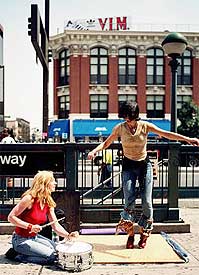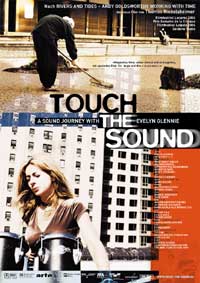I found Touch the Sound (2004) to be dangerously close to nothing more than a Phillip Glass feature length video, but for drummers; if that sounds cool to you, then go for it. It bored me so quickly that I nodded off to sleep for a bit, & perhaps missed the interesting part, if there was one.
It is partly a documentary about Evelyn Glennie. The film alleges that Glennie is the world's first musician ever to make a solo career out of percussion. I suspect she never personally okayed that claim. Since she plays xylophone in the film I guess the filmmaker would include such percussion instruments as xylophone & piano, no professional soloists, right.
 But pretending he meant drums, the claim requires right away to discount famous rock & roll drum soloists as Ginger Baker or Carl Palmer, & to hell with 1920s & 30s solo jazz drummers A. G. Godley & Buddy Tate, not to mention Buddy Rich who followed, or drum soloists Charles "Buddy" Gilmore & Carl "Battle Axe" Kenny who were doing the NYC rooftop gig re-posed by Glennie in this film, but they did it in 1915. But pretending he meant drums, the claim requires right away to discount famous rock & roll drum soloists as Ginger Baker or Carl Palmer, & to hell with 1920s & 30s solo jazz drummers A. G. Godley & Buddy Tate, not to mention Buddy Rich who followed, or drum soloists Charles "Buddy" Gilmore & Carl "Battle Axe" Kenny who were doing the NYC rooftop gig re-posed by Glennie in this film, but they did it in 1915.
So professional solo drummers have been numerous for the better part of a century & we won't even go into the real arena of world music that'd stretch that to a couple thousand years.
Glennie is self-conscious about this "novelty act" component of her life & art, so the documentary doesn't make much of it. Nevertheless, scarsely anyone would want to see Glennie as a "soloist" if she weren't oh-wow a deaf drummer. She'd otherwise be relegated to the back of the orchestra where I'm sure she's a fine fit.
I never felt dismissive of her playing before I saw this combination humdrum documentary & New Age music video. Previously I'd only heard Glennie on the radio giving very intelligent interviews, by which it never occurred to me that she's primarily a novelty act. But now I'm convinced that's what it boils down to.
As a deaf drummer & percussionist she's as good as a lot of drummers no doubt, but there was nothing in this film that made her seem phenominal in terms of talent. I've been bowled over by many a percussionist, but not this one.
 If she is better than the average "good" drummer, then blame director Riedelsheimer for his inability to capture a larger truth. He expends far too much time being artsty fartsy in some way-too-obvious desire to show that the world is full of percussive noises, hence the Phillip Glass element of generic pictorials for a soundtrack, mixing the rackety-tackety sounds of mechanical objects & transportion & urban life with drumming, guitar, & other instruments. If she is better than the average "good" drummer, then blame director Riedelsheimer for his inability to capture a larger truth. He expends far too much time being artsty fartsy in some way-too-obvious desire to show that the world is full of percussive noises, hence the Phillip Glass element of generic pictorials for a soundtrack, mixing the rackety-tackety sounds of mechanical objects & transportion & urban life with drumming, guitar, & other instruments.
These moments of the film lack both musical grace or documentary content & are filler that makes an already overlong film: 99 minutes feels like three hours even with a nap in the middle. So as a documentary it qualifies as ordinary to bad, because even uninteresting stuff can be made interesting by a good documentarian. And I have to assume Glennie is potentially a lot more interesting than conveyed here.
The factual content is also slim, so Glennie isn't even as interesting as she is on the radio. In all, the documentarian has made an interesting subject boring, mostly by wanting to prove what a great videographer he can be by lingering on needless pictures of such fabulous things as concrete or ski lifts. And if he was trying to prove to Chevrolet he was a great photographer of motor vehicles, then I hope he gets to film those commercials he's after.
A lot of time is wasted showing, for example, Frith & Glennie throwing long roles of paper through a warehouse. A film about rowdy pre-teens toiletpapering houses in suburbia on Halloween would've been vastly more fun to see. A lot of what we're shown is like that, either beside the point, unamusingly silly, or blah to the nth degree.
A few actual performances by Glennie are shown at sufficient length to call a performance, but usually just fragments. When accompanied by guitarist Fred Frith, the music is as good as Frith. It would've been just as good without Glennie, but not good at all without Frith.
As a novelty act it is essential to show novelty events, & the documentarian does so, no matter that they are trivializing. So there's a girl tap dancer (New York performance artist Roxanne Butterfly) doing a New York street routine. Glennie gets down on her knees & drums on the sidewalk along with the tapdancing. I'm sure it was cool if you were there, but whatever ephemeral beauty the moment may have had is not to be found on the video tape. It merely appears contrived.
They head off to Ireland to see some rebel drummers, & Glennie brings her snaredrum along so she can "star" in someone else's performance. Or as the documentary opens she plays snare drum in the middle of Grand Central Station; my baby sister played snare drum in the seventh grade just as nicely & could've garnered a bigger crowd doing so.
Or, a Japanese taiko troupe is great, but are they greater because Glennie tosses in, or just polite to allow their own performance to be turned into a tepid Glennie event?
We never see Glennie in context of her classical performances, presumedly because that'd just show her as a drummer for the orchestra. Instead she's presented as primarily a performance artist who gallivants around the world drumming with other performance artists. I'm sure were all happy to have her join in & to be included in the documentary. But fact is she's rarely necessary & often a distraction from the more interesting performers whose thunder she begs, steals, or borrows.
What it boils down to, as music, this just isn't much, & as a documentary, it has too little content to justify its length. And a novelty act without midgets ain't enough.
copyright © by Paghat the Ratgirl
|

 But pretending he meant drums, the claim requires right away to discount famous rock & roll drum soloists as Ginger Baker or Carl Palmer, & to hell with 1920s & 30s solo jazz drummers A. G. Godley & Buddy Tate, not to mention Buddy Rich who followed, or drum soloists Charles "Buddy" Gilmore & Carl "Battle Axe" Kenny who were doing the NYC rooftop gig re-posed by Glennie in this film, but they did it in 1915.
But pretending he meant drums, the claim requires right away to discount famous rock & roll drum soloists as Ginger Baker or Carl Palmer, & to hell with 1920s & 30s solo jazz drummers A. G. Godley & Buddy Tate, not to mention Buddy Rich who followed, or drum soloists Charles "Buddy" Gilmore & Carl "Battle Axe" Kenny who were doing the NYC rooftop gig re-posed by Glennie in this film, but they did it in 1915. If she is better than the average "good" drummer, then blame director Riedelsheimer for his inability to capture a larger truth. He expends far too much time being artsty fartsy in some way-too-obvious desire to show that the world is full of percussive noises, hence the Phillip Glass element of generic pictorials for a soundtrack, mixing the rackety-tackety sounds of mechanical objects & transportion & urban life with drumming, guitar, & other instruments.
If she is better than the average "good" drummer, then blame director Riedelsheimer for his inability to capture a larger truth. He expends far too much time being artsty fartsy in some way-too-obvious desire to show that the world is full of percussive noises, hence the Phillip Glass element of generic pictorials for a soundtrack, mixing the rackety-tackety sounds of mechanical objects & transportion & urban life with drumming, guitar, & other instruments.